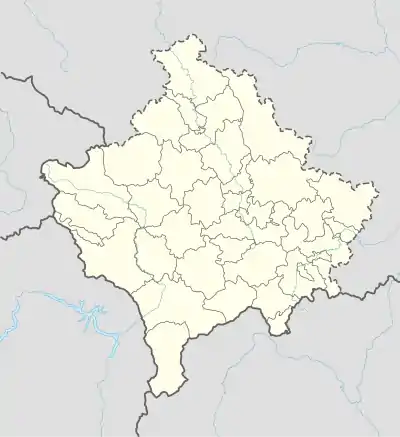Banja, Skenderaj
Banja (Serbian Cyrillic: Бања, Albanian: Bajë or Baja) or Banja Rudnička (Бања Рудничка) is a settlement in the Skenderaj municipality in Kosovo. The rural settlement lies on a cadastral area with the same name, of 1033 hectares. The village has a Serbian majority; in the 1991 census, it had 274 inhabitants.
Bajë
| |
|---|---|
Village | |
 Bajë Location in Kosovo | |
| Coordinates: 42°48′51″N 20°40′21″E | |
| Location | |
| District | Mitrovicë |
| Municipality | Skënderaj |
| Elevation | 761 m (2,497 ft) |
| Population (2011)[1] | |
| • Total | 340 |
| Time zone | UTC+1 (CET) |
| • Summer (DST) | UTC+2 (CEST) |
| Area code | +381 290 |
| Car plates | 02 |
Geography
Banja is located circa 2 km from Rudnik, on the Peć–Kosovska Mitrovica road.[2]
History
Banje or Banja Rudnička is an Old Serbian settlement.[2] It is mentioned for the first time in a charter of Serbian King Stefan Uroš I (r. 1243–1276), dating to the mid-13th century, granted (metochion) to the Gračanica monastery.[2] It was then granted by King Stefan Milutin (r. 1282–1321) to the Banjska Monastery.[2] The village church, dedicated to St. Nicholas, as founded by nobleman Rodop who served Serbian Despot Đurađ Branković (r. 1427–1456), and was buried here in 1436.[3] Two bells found in its ruins are preserved in the Patriarchal Monastery of Peć and National Museum in Belgrade.[3] Between 1936–41 the church was renovated, but destroyed during World War II[3] by Albanian fascists.[4][5][6] The village was among those in North Kosovo that was burned down by Albanian paramilitaries and the Serb population expelled.[7] In 1971 the church was reconstructed.[3] The church was used as a model for an Orthodox church in Norway.[8]
On the night of 21 May 1998 a large number of Albanian Kosovo Liberation Army members of Drenica attacked the villages of Banja and Suvo Grlo (which are inhabited by Serbs) and a military station in Rudnik, above Skenderaj. Serbs and Serbian police answered the fire, no deaths or injuries were reported by them.[9]
| Ethnic group | 1948 | 1953 | 1961 | 1971 | 1981[10] | 1991 |
|---|---|---|---|---|---|---|
| Serbs | 338 | |||||
| Albanians | 32 | |||||
| Total[11] | 552 | 595 | 636 | 513 | 371 | 274 |
References
- 2011 Kosovo Census results
- Kalezić 2002, p. 131.
- Spomenici.
- "Kosovo i Metohija, sećanje (IV) – Zoran Bogavac: Nečujna zvona; Dobrica Erić: Svi moji preci". NSPM.
- "HRIŠĆANSKO NASLEĐE KOSMETA (1)". Glas Srspke.
- "Православне светиње на Косову и Метохији". Kosmet.
- Antonijević, Nenad (2009). Албански злочини над Србима на Косову и Метохији у Другом светском рату, документа (PDF). Muzej žrtava genocida. p. 40. ISBN 9788690632992.
- "Hellige Trifon skita". Ortodoks.
- "Dnevnik od 19. do 24. maja". Ilustrovana Politika (2054). 30 May 1998. Archived from the original on 3 January 2009.
- 1981 Census, Kosovo Archived 2012-03-17 at the Wayback Machine (Preliminary)
- "Kosovo censuses 1948-1991". Archived from the original on 2020-01-13. Retrieved 2012-02-17.
Sources
- Kalezić, Dimitrije M. (2002). A - Z. Savremena administracija. p. 131. ISBN 9788638706716.
- Maletić, Mihailo (1937). Kosovo nekad i danas. p. 402.
- Ristanović, Slobodan (2005). Kroz Srbiju i Crnu Goru. КСЕ-НА. p. 690.
- Влада Републике Србије за Косово и Метохију. "Угрожена културна добра на Косову и Метохији" (PDF).
{{cite journal}}: Cite journal requires|journal=(help) - "Црква Св. Николе". Spomenici kulture.
- "Čudesno selo Banje: U srcu Drenice, Srbija u srcu". KoSSev.
- "САДА НАМ ЈЕ НАЈТЕЖЕ!". Srpska.